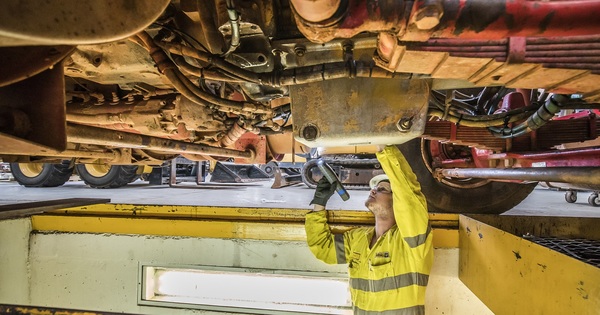Workers at WesTrac, one of Australia’s largest Caterpillar equipment dealers, staged a walkout this week to protest a proposed 50-hour work week, marking a significant escalation in ongoing labor disputes at the company.
The industrial action began Tuesday morning when hundreds of employees at WesTrac’s facilities in Western Australia downed tools and gathered outside company headquarters. The workers, primarily mechanics, technicians, and warehouse staff, are represented by the Aust
...
Workers at WesTrac, one of Australia’s largest Caterpillar equipment dealers, staged a walkout this week to protest a proposed 50-hour work week, marking a significant escalation in ongoing labor disputes at the company.
The industrial action began Tuesday morning when hundreds of employees at WesTrac’s facilities in Western Australia downed tools and gathered outside company headquarters. The workers, primarily mechanics, technicians, and warehouse staff, are represented by the Australian Manufacturing Workers’ Union (AMWU).
Union representatives say the dispute centers on WesTrac’s push to extend standard work hours from the current 38-hour week to 50 hours, a move they claim would drastically impact work-life balance for employees without adequate compensation.
“What WesTrac is proposing would effectively mean our members lose 12 hours of family time each week while receiving minimal additional pay for those extra hours,” said Steve McCartney, AMWU State Secretary for Western Australia. “These workers are already facing significant pressures from rising living costs, and now they’re being asked to sacrifice even more time away from their families.”
The labor dispute comes amid a broader boom in Western Australia’s mining sector, where equipment maintenance and servicing companies like WesTrac have seen surging demand. As a key supplier and servicer of Caterpillar machinery, WesTrac plays a crucial role in maintaining the heavy equipment that powers Australia’s lucrative iron ore and minerals extraction industries.
WesTrac, owned by billionaire Kerry Stokes’ Seven Group Holdings, employs over 3,000 people across Australia. In a statement, the company defended its proposal, saying the new work arrangement would help meet growing client demands while offering enhanced compensation packages.
“The proposed changes are designed to improve our ability to service mining clients who operate on 24/7 schedules,” said WesTrac CEO Jarvas Croome. “Our offer includes significant overtime premiums and additional benefits that would make our employees among the highest-paid in the industry.”
Industry analysts note that the dispute highlights growing tensions in Australia’s resources sector, where companies are struggling to balance operational demands with worker expectations in a tight labor market. The mining equipment maintenance sector has been particularly strained, with companies competing for skilled workers amid the post-pandemic resources boom.
“What we’re seeing at WesTrac is reflective of broader pressures across the mining services industry,” explained Dr. Helena Morrison, a labor relations expert at Curtin University. “Companies are trying to maximize productivity during this period of high commodity prices, but workers are increasingly prioritizing work-life balance alongside compensation.”
The walkout has raised concerns about potential impacts on mining operations across Western Australia, where Caterpillar equipment is ubiquitous across iron ore sites operated by industry giants like BHP, Rio Tinto, and Fortescue Metals Group. Any prolonged disruption to maintenance services could potentially affect equipment availability and production schedules.
Some WesTrac employees participating in the action expressed frustration at what they view as unreasonable demands from management.
“I’ve been with the company for 12 years, and I’m willing to work hard, but 50 hours as standard is just too much,” said James Harrington, a senior diesel mechanic. “Many of us have young families. We’re already doing overtime when needed, but making it mandatory would mean missing kids’ sports games, family dinners, and basically living at work.”
The AMWU has indicated that workers are prepared to escalate actions if negotiations don’t progress. They’re seeking to maintain the 38-hour standard work week while accepting more flexible overtime arrangements with enhanced penalty rates.
WesTrac and union representatives are scheduled to meet with the Fair Work Commission later this week for mediated discussions. The company has committed to maintaining essential services during the dispute to minimize disruption to critical mining operations.
Labor experts note that this dispute comes amid a broader resurgence in union activity across Australia, particularly in the resources sector, where workers are pushing back against extended shifts and demanding a greater share of profits during the current commodities upswing.
“The days when resources workers would accept almost any conditions for high pay appear to be waning,” said Morrison. “Today’s workforce is more focused on sustainable work practices and genuine work-life balance.”
Both sides have expressed a desire to reach a resolution quickly, recognizing the potential economic impacts of prolonged industrial action. For now, hundreds of WesTrac employees remain off the job as they await progress in negotiations over what constitutes reasonable working hours in one of Australia’s most demanding industries.


